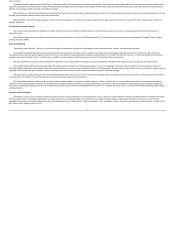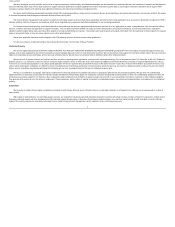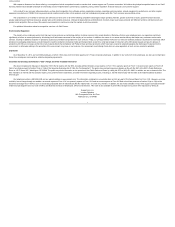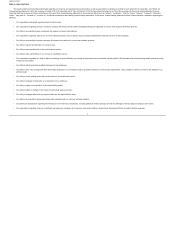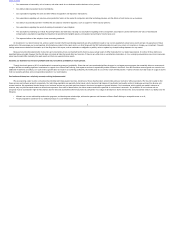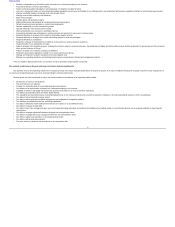Support.com 2014 Annual Report Download - page 16
Download and view the complete annual report
Please find page 16 of the 2014 Support.com annual report below. You can navigate through the pages in the report by either clicking on the pages listed below, or by using the keyword search tool below to find specific information within the annual report.
Table of Contents
Our systems collect, access, use, and store personal customer information and enable customer transactions, which poses security risks, requires us to invest significant resources to prevent or
correct problems caused by security breaches, and may harm our business.
A fundamental requirement for online communications, transactions and support is the secure collection, storage and transmission of confidential information. Our systems collect and store confidential and
personal information of our individual customers as well as our partners and their customers’ users, including personally identifiable information and payment card information, and our employees and contractors may
access and use that information in the course of providing services. In addition, we collect and retain personal information of our employees in the ordinary course of our business. We and our third-party contractors
use commercially available technologies to secure this information. Despite these measures, parties may attempt to breach the security of our data or that of our customers. In addition, errors in the storage or
transmission of data could breach the security of that information. We may be liable to our customers for any breach in security and any breach could subject us to governmental or administrative proceedings or
monetary penalties, damage our relationships with partners and harm our business and reputation. Also, computers are vulnerable to computer viruses, physical or electronic break-ins and similar disruptions, which
could lead to interruptions, delays or loss of data. We may be required to expend significant capital and other resources to comply with mandatory privacy and security standards required by law, industry standard, or
contract, and to further protect against security breaches or to correct problems caused by any security breach.
We are exposed to risks associated with payment card and payment fraud and with payment card processing.
Certain of our customers use payment cards to pay for our services and products. We may suffer losses as a result of orders placed with fraudulent payment cards or other payment data. Our failure to detect or
control payment fraud could have an adverse effect on our results of operations. We are also subject to payment card association operating standards and requirements, as in effect from time to time. Compliance
with those standards requires us to invest in network and systems infrastructure and processes. Failure to comply with these rules or requirements may subject us to fines, potential contractual liabilities, and other
costs, resulting in harm to our business and results of operations.
Privacy concerns and laws or other domestic or foreign regulations may require us to incur significant costs and may reduce the effectiveness of our solutions, and our failure to comply with those
laws or regulations may harm our business and cause us to lose customers.
Our software and services contain features that allow our technology specialists and other personnel to access, control, monitor and collect information from computers and other devices. Federal, state and
foreign government bodies and agencies, however, have adopted or are considering adopting laws and regulations restricting or otherwise regulating the collection, use and disclosure of personal information
obtained from consumers and individuals. Those regulations could require costly compliance measures, could reduce the efficiency of our operations, or could require us to modify or cease to provide our systems or
services. Liability for violation of, costs of compliance with, and other burdens imposed by such laws and regulations may limit the use and adoption of our services and reduce overall demand for them. Even the
perception of privacy concerns, whether or not valid, may harm our reputation and inhibit adoption of our solutions by current and future customers. In addition, we may face claims about invasion of privacy or
inappropriate disclosure, use, storage, or loss of information obtained from our customers. Any imposition of liability could harm our reputation, cause us to lose customers and cause our operating results to suffer.
We rely on third-party technologies in providing certain of our software and services. Our inability to use, retain or integrate third-party technologies and relationships could delay service or software
development and could harm our business.
We license technologies from third parties, which are integrated into our services, technology and end user software. Our use of commercial technologies licensed on a non-exclusive basis from third parties
poses certain risks. Some of the third-party technologies we license may be provided under “open source” licenses, which may have terms that require us to make generally available our modifications or derivative
works based on such open source code. Our inability to obtain or integrate third-party technologies with our own technology could delay service development until equivalent compatible technology can be identified,
licensed and integrated. These third-party technologies may not continue to be available to us on commercially reasonable terms or at all. If our relationship with third parties were to deteriorate, or if such third parties
were unable to develop innovative and saleable products, or component features of our products, we could be forced to identify a new developer and our future revenue could suffer. We may fail to successfully
integrate any licensed technology into our services or software, or maintain it through our own development work, which would harm our business and operating results. Third-party licenses also expose us to
increased risks that include:
15
EDGAR Stream is a copyright of Issuer Direct Corporation, all rights reserved.


